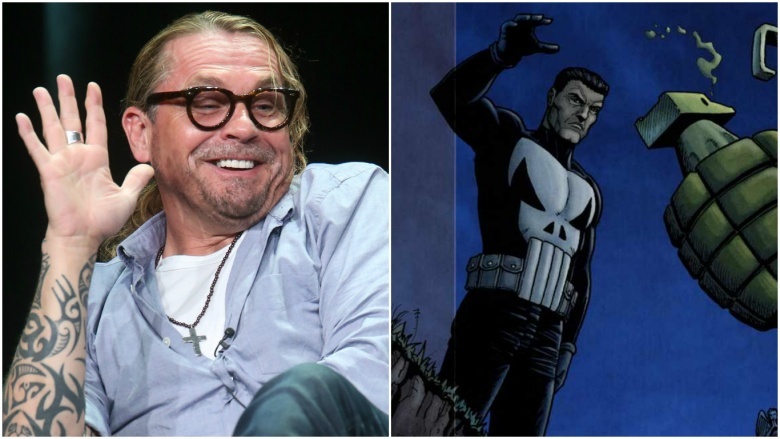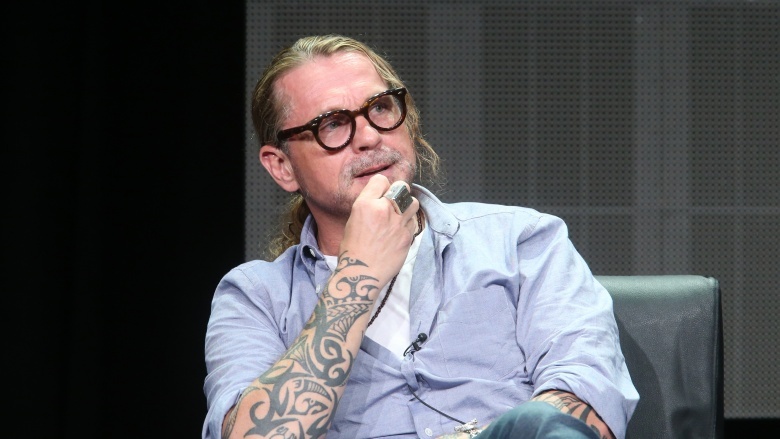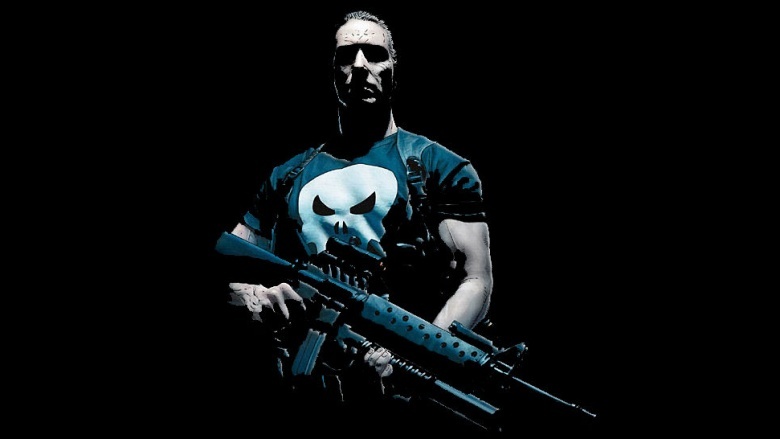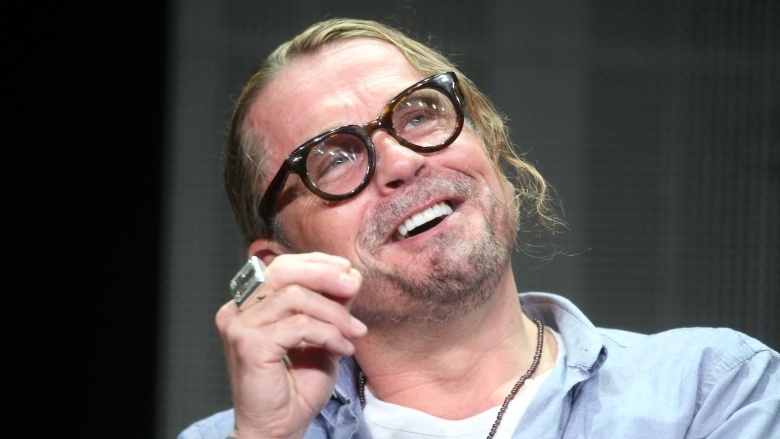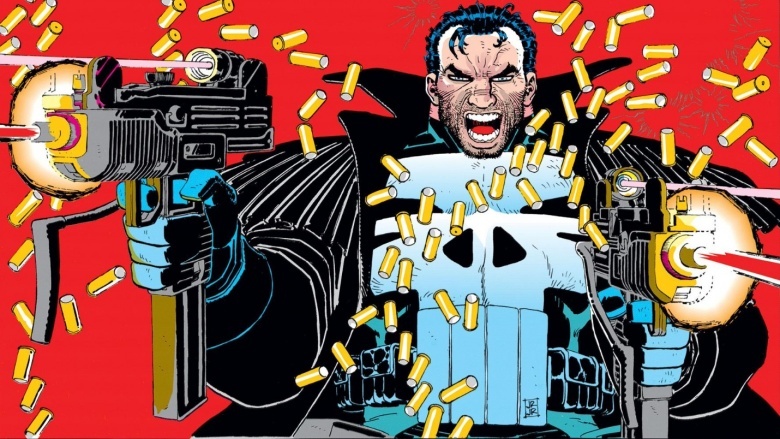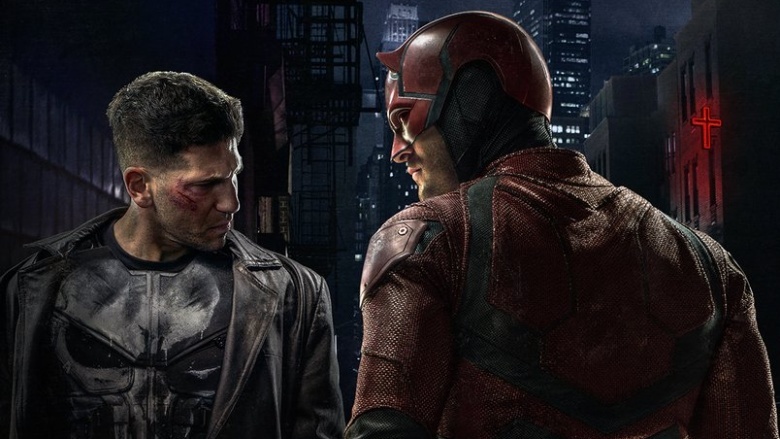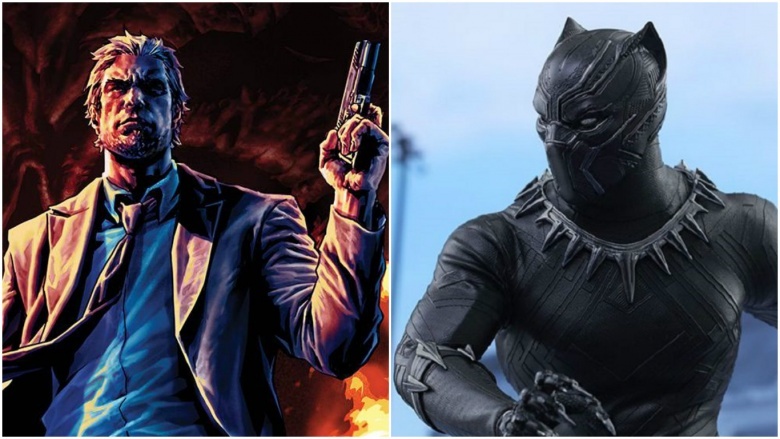Kurt Sutter On The Punisher Movie We Never Got To See
When it comes to comic book antiheroes, you don't get much more famous—or infamous—than Marvel's The Punisher. The character captured readers' imaginations pretty much from the moment he made his debut in The Amazing Spider-Man #129 in February 1974, but for years, he had a hard time making the jump to the big screen. Attempts were made with 1989's The Punisher, starring Dolph Lundgren; 2004's The Punisher, starring Thomas Jane; and 2008's Punisher: War Zone, starring Ray Stevenson, all of which ranged from "total and utter misfire" to "well-intentioned but misguided" (your personal mileage may vary). But there's one Punisher film that no one ever got to see: The Punisher 2, a sequel to the 2004 film, which was scripted by Kurt Sutter, at the time a writer on FX's The Shield.
By the time The Punisher 2—which, of course, eventually came to be known as Punisher: War Zone—eventually made it to theaters in December 2008, its script was credited to Art Marcum, Matt Holloway, and Nick Santora. Sutter's absence from the credits came at his request, and it was, as he clarified on his personal blog, for two perfectly good reasons: he felt he neither wanted nor deserved credit for the final product. On the other hand, by that point, Sutter's name was somewhere far more prominent: in the credits of FX's Sons of Anarchy, as the series' creator, executive producer, and sometime cast member. (He played Otto, you know.)
Looper reached out to Sutter and asked him if he'd be willing to peer back through the mists of time and reflect on his efforts as a Punisher screenwriter, acknowledging that the project had passed from old news into the realm of pop culture archaeology. To our delight, he accepted our invitation and hopped on the phone for a chat.
Preparing for Punishment
Looper: First of all, we appreciate you being willing to endure a flashback that's as ridiculously far back as this one.
Kurt Sutter: [Laughs] You know, I actually looked for that script over the weekend, because I thought I had it on a key somewhere, but...I couldn't find it!
I'm sure there's a hard copy in some archive somewhere, but I couldn't find mine. I was just curious to revisit it.
Well, you know the internet: probably every draft you've ever done of everything is out there somewhere.
Probably!
The Punishment Begins
So how did you come to pen a Punisher screenplay? Had you been a diehard Punisher fan and always wanted to try your hand at the character, or was it an idea that was pitched to you?
It was really just career stuff. What I try to do over my hiatus from a show... I'd have two or three months of downtime – which on Sons of Anarchy ultimately became more like two or three days, but at this point, which was toward the end of The Shield, it was still two or three months – and I would always try to do a feature film project. I'd either write something on spec or, like, I had a deal with Warner Brothers for two scripts, so I wrote Southpaw during a hiatus from Sons. But I always tried to keep my toe in the feature waters.
I had a couple of general meetings with Gale Anne Hurd, producer of The Walking Dead, and we had talked about a couple of things. She was a producer on the Punisher film, and they had gotten a draft of the script, so they brought me in, and I pitched what some of the fixes were. But I was very new to the rewrite game. In fact, that was my first rewrite, at least in terms of features. You sort of pitch what your ideas are, they tell you what they like and what they don't like, and then they say "yes" or "no" and they cut you loose. This was right around the writers' strike, or circling that period, so I go off and I do my thing.
I was thinking about this conversation this morning, and...I'm not a guy who really can stay inside the lines very well [Laughs]. And I think that's why I don't have a bigger feature career. I mean, obviously TV occupies my time, and it's my passion, but the TV rewrite game and big-project game is such a formulaic process. And I'm not saying that as a bad thing. It's just what it is. And I really have had trouble finding my voice in that kind of rigid a structure. TV has its own structure as well, obviously, but with a serialized show, you're not limited to any restrictions on character or narrative or relationship. You can move at any pace, in any direction. Whereas with features, it's first twist within 15 minutes, plot shift at the half-hour...you know the deal. And it's cool, and it works, and that's what it is. But then you take a company like Marvel, that has a billion-dollar corporation based on a formula—a very specific formula—that they know generates income. And Kevin (Feige) is a super intelligent guy, but he's a businessman, and he knows what works and he knows what doesn't work. So they hand off this project to me, and my whole thing was, "I'm just gonna f— up the formula! I'm gonna mix it up! I'm gonna make it different!" Thinking that was a good idea. And not, like, "f— up the formula" in a Tarantino kind of way, but just in terms of what was expected.
There are a few things I remember. I remember there was a woman involved who was sort of the handler of the cop who gets killed, and there's a relationship that develops between her and the Punisher. I had all these things that they basically didn't ask for, but in the process of writing...I mean, that's just how I write! I'll get inside the characters and I'll start writing, and I'll be, like, "Oh, f—, that is awesome!" And the story will come alive for me, and I'll start jamming. But in the end, I think they only kept one thing from my draft, and that was how Jigsaw becomes Jigsaw. Because the original had it that he crawls through a window of a church or something, and I'm the one who had the mob brought in, along with the recycling thing, where he falls into the recycling machine and gets all f—ed up. But I think that's the only thing they actually kept from my draft!
So I turn in this draft, and I'm, like, "Aw, yeah, I'm shakin' up Marvel, man!" And literally there were people—including Gale Ann Hurd—who were, like, "Uh..." They didn't know what the f— happened! And it's not like I didn't do the things I said I was going to do, but...I also did a lot of other things! And I'm a Marvel fan, but I was not a comic book kid. I didn't really get into that whole world until about 15 years ago, which is when I started getting into graphic novels. And that happened in Paris, because their graphic novel industry is decades beyond ours! But I didn't realize that you can't take liberties with some of the characters and some of the traits, because they are what they are. They're very derivative, they're stereotyped, but this is the guy that does this, and this is the guy who does this... So they're two-dimensional for a reason: that's the purpose they serve. So I was trying to expand the Marvel Universe in a direction it should not have been expanded in [Laughs].
I think I did another pass on the script after that, but it was clear that I was just not the guy. You know, I wasn't the guy to go to to initiate or improve a formula. If I do rewrites now, it's usually just dialogue and character punch-up, and I'll do a week here and there, because that I can do well...and I don't get into stories! I just try to make it flow a little bit better. I don't try to expand anything.
God bless Marvel, though. And Gale's a wonderful producer. I was just too naïve in the process. And then when the script came out, I read a draft of it, and...well, again, it was everything I was trying not to do! It was by the numbers, and it was everything I tried to shake up. And I was, like, "Well, wait a minute!" It took me awhile to realize that, oh, that's exactly what they wanted! In my opinion, it was not Marvel's best outing, so I don't really have any regrets that my name wasn't on that project.
"I think I was trying to write to the emotionality of this dude."
When you were working on the script, were you angling it toward any particular incarnation of the character?
Doing the research on it, he's such an iconic character and really pretty much every vigilante since has some piece of that, but what I think I was trying to do... I'd known Thomas Jane a little bit, and I thought he was a great actor and had a lot of emotional depth that maybe some other action stars may not have. So I think I was trying to write to the emotionality of this dude and motivate the absurd violence with some kind of meaning. I don't mean that I was, like, f—ing Gandhi [Laughs]. But I was just trying to root it a little bit more in the mental anguish that he went through to justify it, and to take a little bit of that journey. And that's why I had the connection with the female character: because I was able to explore that pain through that relationship. So I think that's what I was trying to do: humanize him a little bit more. But it's the kind of thing where there's only X amount of time the movies, so you have moments of that, but you can't really have a subplot that explores that kind of thing. Not in a summer blockbuster or Marvel picture.
"I think they realized what I was trying to do...and how wrong that was."
The script obviously didn't meet Marvel's particular needs, but was there any response from anyone along the lines of, "I wish we could do this, but we can't"?
You know, if there was, I don't think that's something that would ever have been vocalized to me. Look, it's not like I turned in the script and it was written in a different language. I mean, there were parts of it they liked. I think they realized what I was trying to do...and how wrong that was [Laughs]. So they tried to guide me back, and like I said, I did another pass, but poor Gale Anne Hurd—I think she's the one who sort of championed me in that process. And Kevin...We were sitting at a big table, and I think she started glancing over at Kevin, going [whispering under breath] "I don't know what happened!" Anyway, I'm sure there was good feedback, but as a writer, all I ever hear is bad feedback! And I think at that point, Marvel was already...not quite the machine it is now, but it was finding its legs. And I think there was just a process that was going down, and there were a lot of people who were sort of being let go and given producing gigs. They started cleaning house a little bit at that time and managing the IPs in a different way, and Kevin pretty much led that charge.
Stepping Sideways from Daredevil into Sons of Anarchy
So what do you think of the introduction of the Punisher in Netflix's Daredevil series?
I haven't gotten to it yet! I just started getting into the series, and I'm almost done with the first season. Who plays the Punisher?
Jon Bernthal.
Oh, wow, that's really cool! Well, I like the series. I think all those actors are really smart choices. But I haven't gotten to the Punisher yet. What do you think of it?
I think it's as good a representation as we've seen yet. Not to dismiss anyone's past performances, but just in terms of being the character from the comics, it's as close as they've gotten.
That's interesting, but it kind of makes sense, because as powerful a character as Frank Castle is, there's a real linear component to that narrative, and it almost works better tangentially, alongside of another story rather than standing up on its own. For some reason, every one they've ever tried – feature-wise, anyway – really hasn't landed.
Well, this one's landed well enough that they're moving forward with a Punisher series, which will give them an opportunity to tell more of his story.
Yeah! That's what you're able to do with TV: you can go sideways. You just can't go sideways in a feature. Not unless it's an indie. But in terms of Hollywood, the narrative has to be moving forward.
Speaking of going sideways, talking about Daredevil reminds me: last year I did an interview with Scott Glenn, who plays Stick in the series, and he related an anecdote about the initial table read for the Sons of Anarchy pilot, when he was still set to play Clay.
[Starts to laugh] Oh, yeah? Should I read it, or should I not read it?
Well, I'm sure you know the story already, but he wasn't exactly fond of the conversation going on in the room at the time.
I'll tell you, that was the hardest phone call I'd ever had to make in my career. Ironically, Scott lives in Idaho, and about two years ago we bought a house out there, and I see him when I go out there now. We actually had a housewarming and invited him. So we're all good now. And The Leftovers is my favorite show, and I think he's awesome on there. He's a great dramatic actor. But there was just a weight to Clay, and I was missing the sardonic smart-ass. Because a lot of that dark humor, at least in the first few seasons, came from Clay. And it's really something that Scott didn't embrace. He had trouble making jokes or making references. He couldn't embrace it, and he couldn't understand it. So ultimately it was really more about tone than anything. But, man, that's a brutal call to make.
Well, just to put your mind at ease, his anecdote actually starts, "The guy who wrote Sons of Anarchy, his name's Kurt Sutter and I think he's a really good writer, so this is no reflection on him."
Well, there you go. Yeah, Scott definitely does his own thing!
Lucas Stand and Black Panther
Lastly, is there any comic character that you'd like to take a shot at adapting or working with?
You know, I've been working with Boom! for awhile now—they do the Sons of Anarchy comic, and I sort of got pulled into that world—and I actually have two projects with them now. One was initially a script for a series called Lucas Stand, this sort of demon-hunter thing, which is so out of my milieu. But I sold it to them, and we have a first issue coming out in June. And then I sold them another project about... [Starts to laugh] I almost can't say it, but I love this f—ing story so much: it's basically about vigilante nuns!
Nice.
So I'm sort of coming into the comic book world from the other direction, creating content for other people rather than adapting stuff. But I'm such a big fan of all this superhero stuff. It's very interesting: being a TV kid, I was introduced to all of that stuff through cartoons—Batman, Superman, all the DC stuff, and then obviously Spider-Man—so I didn't get it so much through the comic books as I did through the 750 hours of TV I watched every week.
But I will say that, although I haven't seen [Captain America: Civil War] yet, I love the notion of this Black Panther character, and Chadwick [Boseman] is such a good actor. I just think that to take human issues and s— that still plagues our society, like racism and poverty and s—, and somehow work that into the fiction of a world where superheroes live...that's just an interesting direction to go in. And I don't know what direction they're going to go in with that character, but to me, if you're a dude who can kill somebody in an instant, and they call you the N-word, what do you do? [Laughs] How can you not f—ing explore that? That dynamic is fascinating to me. But here I go again: expanding the Marvel Universe in the wrong direction. See, this is why I never get hired!
